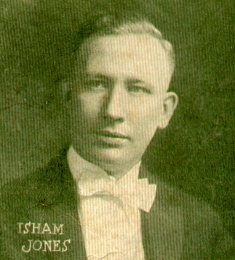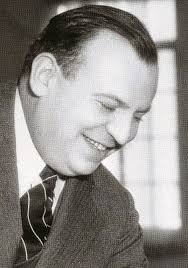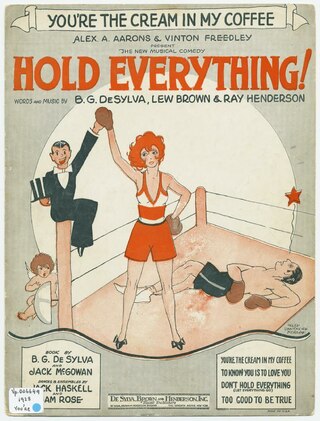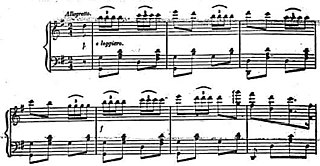"Stormy Weather" is a 1933 torch song written by Harold Arlen and Ted Koehler. Ethel Waters first sang it at The Cotton Club night club in Harlem in 1933 and recorded it with the Dorsey Brothers' Orchestra under Brunswick Records that year, and in the same year it was sung in London by Elisabeth Welch and recorded by Frances Langford. Also in 1933, for the first time the entire floor revue from Harlem's Cotton Club went on tour, playing theatres in principal cities. The revue was originally called The Cotton Club Parade of 1933 but for the road tour it was changed to Stormy Weather Revue; it contained the song "Stormy Weather", which was sung by Adelaide Hall.

Isham Edgar Jones was an American bandleader, saxophonist, bassist and songwriter.

Alexander Dubin was an American lyricist. He is best known for his collaborations with the composer Harry Warren.

"Goodnight, Irene" or "Irene, Goodnight," is a 20th-century American folk standard, written in 3
4 time, first recorded by American blues musician Huddie 'Lead Belly' Ledbetter in 1933. A version recorded by the Weavers was a #1 hit in 1950.
"Begin the Beguine" is a popular song written by Cole Porter. Porter composed the song during a 1935 Pacific cruise aboard the Cunard ocean liner Franconia from Kalabahi, Indonesia, to Fiji. In October 1935, it was introduced by June Knight in the Broadway musical Jubilee, produced at the Imperial Theatre in New York City.
"Thinking of You" is a popular song, composed by Harry Ruby with lyrics by Bert Kalmar. It was introduced in the Broadway show, The Five O'Clock Girl (1927) when it was sung by Mary Eaton and Oscar Shaw.
"Tangerine" is a popular song. The music was written by Victor Schertzinger, the lyrics by Johnny Mercer. The song was published in 1941 and soon became a jazz standard.
"Deep Purple" is a song and the biggest hit written by pianist Peter DeRose, who broadcast between 1923 and 1939 with May Singhi as "The Sweethearts of the Air" on the NBC radio network. The British rock band Deep Purple named themselves after the song.

"You're the Cream in My Coffee" is a popular song published in 1928. Hit recordings were by Annette Hanshaw, Ben Selvin, Ted Weems and Ruth Etting.
"Calcutta" is a German pop song. An instrumental version by American bandleader and TV host Lawrence Welk on the 1961 Dot Records album Calcutta! was a Number One song in the United States, and the most successful hit of Welk's career.

"Buffalo Gals" is a traditional American song, written and published as "Lubly Fan" in 1844 by the blackface minstrel John Hodges, who performed as "Cool White". The song was widely popular throughout the United States, where minstrels often altered the lyrics to suit local audiences, performing it as "New York Gals" in New York City, "Boston Gals" in Boston, or "Alabama Girls" in Alabama, as in the version recorded by Alan Lomax and Shirley Collins on a 1959 field recording trip. The best-known version is named after Buffalo, New York.
"Isn't It Romantic?" is a popular song and part of the Great American Songbook. The music was composed by Richard Rodgers, with lyrics by Lorenz Hart. It has a 32-bar chorus in A–B–A–C form. Alec Wilder, in his book American Popular Song: The Great Innovators 1900–1950, calls it "a perfect song."
"Tico-Tico no fubá" is a Brazilian choro song written by Zequinha de Abreu in 1917. Its original title was "Tico-Tico no farelo", but since Brazilian guitarist Américo Jacomino "Canhoto" (1889–1928) had a work with the same title, Abreu's work was given its present name in 1931, and sometime afterward Aloysio de Oliveira wrote the original Portuguese lyrics.

"The Gold Diggers' Song " is a song from the 1933 Warner Bros. film Gold Diggers of 1933, sung in the opening sequence by Ginger Rogers and chorus. The entire song is never performed in the 1933 movie, though it introduces the film in the opening scene. Later in the movie, the tune is heard off stage in rehearsal as the director continues a discussion on camera about other matters.
Dudley Mecum (1896–1978) was an American pianist, vocalist and songwriter. He was based in Chicago and had a musical group, Dudley Mecum's Wolverines. In the 1920s he also performed with a number of other ensembles such as Merritt Brunies and his Friar's Inn Orchestra. Mecum wrote the lyrics for the song "Angry" which was composed by Merritt Brunies, Henry Brunies, and Jules Cassard in 1925. By 1929 Mecum had become a full-time songwriter. His other published pieces included "How's Your Folks and My Folks", recorded by the pianist and vocalist Art Gillham while testing new electric microphone technology, "I've Got the Blues for Tennessee", co-written by Mecum with Cal DeVoll and Wallace Bradley.
"Top Hat, White Tie and Tails" is a popular song written by Irving Berlin for the 1935 film Top Hat, where it was introduced by Fred Astaire.
"Dancing on the Ceiling" is a 1930 popular song composed by Richard Rodgers, with lyrics by Lorenz Hart for the 1930 London musical Ever Green when it was sung by Jessie Matthews. It was originally part of the musical Simple Simon, but it was cut from the production before the premiere. In the film of Evergreen (1934), "Dancing on the Ceiling" was again sung by Jessie Matthews.
"42nd Street" is the title song from the 1933 Warner Bros. backstage musical film 42nd Street, with music by Harry Warren and lyrics by Al Dubin. The song was published in 1932. It is the finale of the film, where it was sung by Ruby Keeler, Dick Powell and ensemble. It was used again in 1980 when the film was adapted as a long-running Broadway musical. In 2004 the song placed #97 in AFI's 100 Years...100 Songs survey of the top tunes in American cinema.

"By a Waterfall" is a 1933 song with music by Sammy Fain and lyrics by Irving Kahal. It was featured in an extravagant choreographic arrangement in the film Footlight Parade by Busby Berkeley that features his trademark human waterfall, with vocal performances by Dick Powell and Ruby Keeler. It features a water ballet of chorus girls diving and swimming into the water in elaborate geometric and floral patterns.
"Oh! What it Seemed to Be" is a song composed by Bennie Benjamin, George Weiss and Frankie Carle. The song was most popular in 1946, and was taken to number 1 that year by both Frank Sinatra and the Frankie Carle orchestra, the latter with Marjorie Hughes on vocals.





